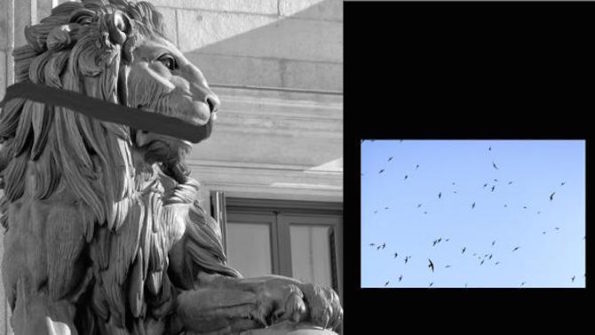Search
To search for an exact match, type the word or phrase you want in quotation marks.
A*DESK has been offering since 2002 contents about criticism and contemporary art. A*DESK has become consolidated thanks to all those who have believed in the project, all those who have followed us, debating, participating and collaborating. Many people have collaborated with A*DESK, and continue to do so. Their efforts, knowledge and belief in the project are what make it grow internationally. At A*DESK we have also generated work for over one hundred professionals in culture, from small collaborations with reviews and classes, to more prolonged and intense collaborations.
At A*DESK we believe in the need for free and universal access to culture and knowledge. We want to carry on being independent, remaining open to more ideas and opinions. If you believe in A*DESK, we need your backing to be able to continue. You can now participate in the project by supporting it. You can choose how much you want to contribute to the project.
You can decide how much you want to bring to the project.

Micro and macro colonial stories transversally occupy our living spaces. Questions tied to the supremacy of certain nationalities, languages and identities, often thought of in racial terms, account for the way the colonial story imposes some forms of acting over others. This pattern is motive for dispute, although some resist accepting it. As Walter Mignolo states, “the problem of colonialism affects all of us”. It is urgent we ask ourselves, how to coordinate new pathways that don’t sustain either the supremacy of the European account or that of the West in general; how to think of ourselves from another framework, separated from what Mignolo himself calls “the colonial power matrix”. In short, the official histories imposed as superior need to be dissected and displaced.
The way in which the Spanish Empire’s plundering of the American colonies is recounted usually leans towards the empty rhetoric of a “meeting of civilizations” rather than the pillaging. It is not exclusively about returning to the past to criticise what has happened, but yes to relating differently to the centuries of domination that have imposed silences in many ambits and the transmission of the memories of power from times past up until now. Along the same lines we find the work of the group of research and artistic production called Declinación Magnética. The title of their exhibition Hasta que los leones no tengan historiadores…(Until lions have their own historians) (Matadero, Madrid, 2014) eloquently evidences, from where the tales of those who have been in the colonial position (the hunters) have been pronounced and what is the legacy they have wanted to transmit. The challenge lies in identifying and communicating shared histories (geopolitically speaking) and sharing them to reveal the differences imposed, to disarticulate critically the narratives of domination.
The challenge in the artistic field, and in the political, is in creating and producing meanings from a place that isn’t euro-centric or global-centric, heeding the micro-stories, to echo them and grant them corpus. If it’s about one thing, it is about altering the official historiography, to force the opening up of a framework so that the forms of interpretation allow the incorporation of other realities that are not exclusively new, so much as with the elimination of the hierarchies can accommodate the way objects and stories are related to. Through the displacement of “the colonialism of knowledge”, other forms of production can also enter into play, ones that generate different aesthetic sensibilities, because the present calls for new attacks upon and relations with established forms of knowledge. Such is the work of Mujeres creando, a collective of which the feminist activist María Galindo forms part. Its actions resituate the visibility of women, questioning what for them constitutes the root of the problem: the continued prevalence of the patriarchy.
In the case of the semiologist Walter Mignolo, to whom we could recently listen at MACBA,we could recently listen at MACBA, resorts to his biography to explain what led him to compose a line of investigation about decolonialism: ““The son of Italians, born in Argentina. Interested in philosophy, I began to study and read many Europeans. I travelled to Europe to continue delving deeper into the material, but they made me realize I’m a sudaca. Then I went to the United States and they called me Latin American …” ” In this history of labels (immigrant, sudaca, Latin American, Hispanic…) and the imposition of forms of knowledge, Mignolo proposes precisely to revise from where such colonial discourses were organised, how they were articulated and how they were imposed. (Read as a rapid note: what forms the basis for decolonization as a critical tool is to identify the forms of knowledge imposed at the cost of erasing others, to later displace them, question them and thus compose different activations of the political histories that configure us as subjects.)
The role of colonial knowledge in contemporary history continues to prevail and is primordial, but its revision and re-articulation matter, as much as the drawing up of other types of cartography to recuperate a concept of Suely Rolnick [[Suely Rolnik, “The Geopolitics of Pimping”, at http://eipcp.net/transversal/1106/rolnik/en]].
What ought to happen when we refer to the term decolonize? Ideally, we ought to experience an alteration: our thoughts and actions ought to shift place, in order to link us, in recognition of the past we share that situates us in a complex present. To accept the modes in which historically we have related the colonized with the colonizers, also implies taking responsibility for the questioning, exposing oneself to criticisms without propitiating new obscurantism. The putting of this idea into practice allows me to think about the issues MACBA has been enveloped in, concerning the exhibition La bestia y el soberano, an authentic exhibition argument about the way certain sectors don’t assimilate decolonial stances. The work, in which the representation of the king and his imperial imprint, generate sufficient repudiation to promote the closure of the show, evidences a rejection eroding the imprints of the museum’s lines of investigation concerning the production of meanings close to decolonialism, which supposes opening breaches for ideologies of inclusion of other stories, assuming the wound, but what is happening is quite the contrary.
Before ending, I recuperate a public debate that anticipated this polemic and raised some questions. The situation arose in the seminar Descolonizar el museo. An atmosphere was generated there where one sensed the need to relate to the institution from less hierarchical places, in which the incorporation of artistic knowhow or themes explored didn’t have to pass constantly through a filter, so much, as on the contrary, there would be room for them as forms of unrestricted radical and imaginative activation. In short the need to be emancipated from the corseted legitimations proposed by certain political cultures. I stick to the example of MACBA in order to mention a counter story, which at first glance doesn’t seem linked to colonial strata, but which, in effect, copies a structure that, without any anaesthetic, sticks its finger in the wound to operate and extract what bothers it: the rooms of the museum that house the work of Ines Doujak are in themselves one of the scenarios of the colonialism of knowledge being cooked up in our most immediate present. Such is the nakedness exhibited by the work, the violence, even the caricature of colonial discrimination, its visibility was denied. Today few could say that decolonialism constitutes a critical activism at the margins of aesthetics and politics. It undoubtedly occupies a ubiquitous centrality, where we are all obliged to look at the way the parcel of common and (de)colonial space in which we move is managed.

An incurable onlooker, Aymara Arreaza R. uses walking around, reading, the criticism of displacement and questioning as her working tools. She is a hybrid of trades: expressing herself through writing, some of her own images, teaching as well as research projects that she backs up with the construction of more personal geographies. Since 2011 she directs www.rutadeautor.com
"A desk is a dangerous place from which to watch the world" (John Le Carré)